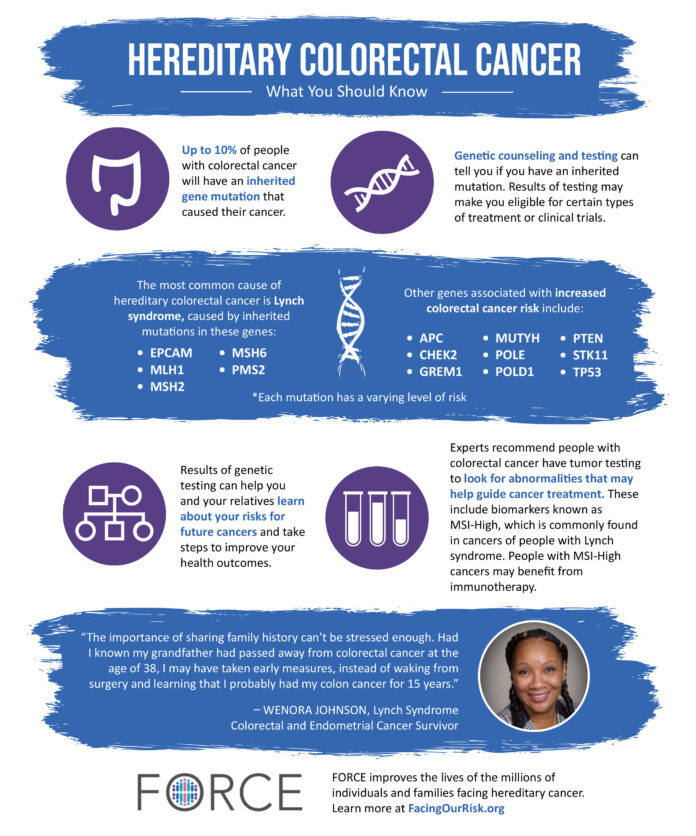
Advancements in Hereditary Colon Cancer Screening: A Lifesaving Breakthrough
Colon cancer is one of the most common and deadliest forms of cancer worldwide. According to the American Cancer Society, it is estimated that there will be around 104,270 new cases of colon cancer and 45,230 deaths from the disease in the United States alone in 2021. However, recent advancements in hereditary colon cancer screening have paved the way for a lifesaving breakthrough in the detection and prevention of this deadly disease.
Hereditary colon cancer, also known as hereditary nonpolyposis colorectal cancer (HNPCC) or Lynch syndrome, is an inherited genetic condition that increases a person’s risk of developing colon cancer and several other types of cancer, including uterine, ovarian, stomach, and small bowel cancer. It is caused by mutations in specific genes involved in DNA repair, such as MLH1, MSH2, MSH6, and PMS2.
In the past, the diagnosis of hereditary colon cancer relied on the identification of a strong family history of the disease. However, this approach was limited because many individuals with hereditary colon cancer lacked a family history of the disease, and it did not provide a definitive molecular diagnosis. Moreover, it was not effective in identifying individuals at risk for other cancers associated with Lynch syndrome.
Advancements in genetic testing technologies have revolutionized the detection and management of hereditary colon cancer. The development of next-generation sequencing (NGS) has made it possible to analyze multiple genes simultaneously, providing a more comprehensive assessment of an individual’s genetic risk. This technology has allowed researchers to identify a wider range of gene mutations associated with hereditary colon cancer, expanding our understanding of the disease.
One of the most significant breakthroughs in hereditary colon cancer screening is the implementation of universal screening for Lynch syndrome. Traditionally, screening for Lynch syndrome was only recommended for individuals with a family history of the disease. However, recent studies have shown that up to 50% of individuals with Lynch syndrome have no family history of colon cancer. As a result, universal screening has been recommended for all individuals diagnosed with colon cancer. This approach has led to the identification of a significant number of individuals with previously undiagnosed Lynch syndrome, enabling them to make informed decisions about their future cancer risk and treatment options.
Another crucial advancement in hereditary colon cancer screening is the incorporation of multi-gene panel testing. This approach involves analyzing a panel of genes associated with hereditary colon cancer, including genes involved in DNA repair, tumor suppression, and cell cycle regulation. Multi-gene panel testing allows healthcare professionals to identify individuals with mutations in genes other than the well-known MLH1, MSH2, MSH6, and PMS2 genes. This knowledge enables personalized treatment and surveillance strategies for these individuals, reducing their risk of developing other types of cancer associated with Lynch syndrome.
Additionally, the development of genetic counseling services has played a crucial role in the advancements of hereditary colon cancer screening. Genetic counselors are trained professionals who assess individuals’ personal and family history, facilitate genetic testing, and provide counseling and support throughout the testing process. They help individuals understand the implications of genetic test results, make informed decisions regarding their healthcare, and navigate the complex emotional and psychological challenges associated with hereditary colon cancer. The integration of genetic counseling services into hereditary colon cancer screening programs ensures that individuals receive comprehensive care and support.
In conclusion, advancements in hereditary colon cancer screening have brought about a lifesaving breakthrough in the detection and prevention of this deadly disease. The development of next-generation sequencing, universal screening for Lynch syndrome, multi-gene panel testing, and genetic counseling services have expanded our understanding of hereditary colon cancer and enabled more accurate identification of individuals at risk. These advancements will undoubtedly lead to earlier detection, personalized treatment plans, and improved outcomes for individuals with hereditary colon cancer and Lynch syndrome, ultimately saving lives.

















